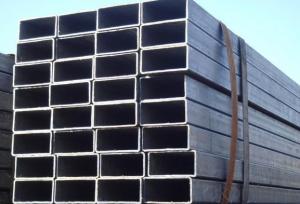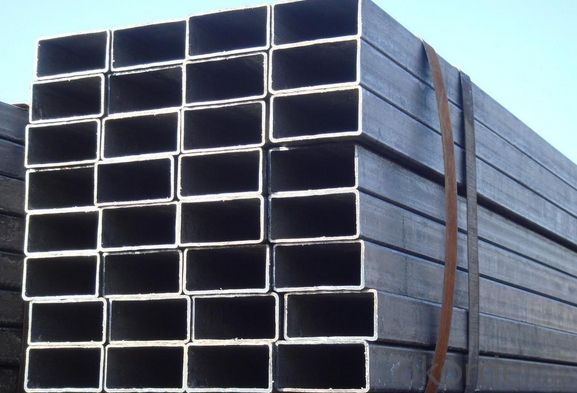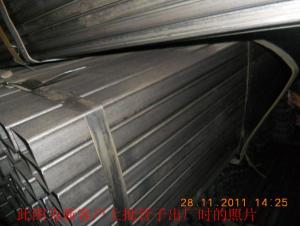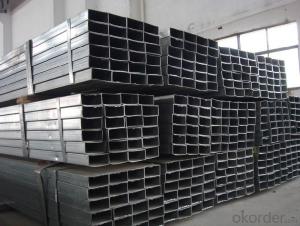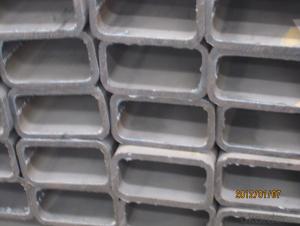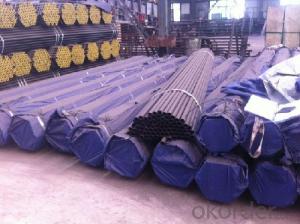Rectangular Hollow Section Tube
- Loading Port:
- China Main Port
- Payment Terms:
- TT OR LC
- Min Order Qty:
- -
- Supply Capability:
- -
OKorder Service Pledge
OKorder Financial Service
You Might Also Like
Product Name | ||
Size | Size: | 10*10--500*500mm |
Thickness: | 0.45--16mm | |
Length: | 3-12m | |
Steel Grade | Q195,Q215,Q235,Q345,16Mn, 20# | |
Standard | ASTM A500,EN10219,GB/T6728,GB/T6725,JIS G3466 | |
Usage | 1. For Structure, Airport, Railway 2. Construction and so on. | |
Ends | Plain end or By Your Choice | |
Surface | Bared Or With Oiled Or Galvanized | |
Technique | ERW ,Hot Rolled and Cold Rolled | |
Section Shape | Rectangular | |
Inspection | With Hydraulic Testing, Eddy Current , Infrared Test | |
Package | Bags, Bundle, In Bulk, Containers | |
MOQ | 20 Metric Ton / Can Be Negotiated | |
Supply Ability | 15,000 Metric Ton/Month | |
Date of Delivery | 7 days(Qty within 1000 Metric Ton) or According To The Quantity | |
Port of Shipment | Tianjin, China | |
Payment | L/C T/T | |
- Q: How much is 4 inches steel tube MM?
- The nominal diameter of the 4 inch steel pipe is DN100, that is to say, the diameter of the center of the pipe wall is 100mm.
- Q: Can steel pipes be used for underground fire sprinkler systems?
- Underground fire sprinkler systems can indeed utilize steel pipes. The reason for their frequent usage in fire sprinkler systems is because of their robustness, endurance, and ability to withstand heat and corrosion. They prove to be suitable for underground installations as they guarantee a dependable and long-lasting performance. Moreover, steel pipes come in a variety of sizes and configurations, allowing for flexibility in the design and installation of underground fire sprinkler systems. Nevertheless, it is crucial to ensure that the steel pipes are properly coated or protected to prevent corrosion and maintain their effectiveness in an underground setting. Regular inspections and maintenance are also imperative in order to identify any potential issues or damages to the steel pipes, thus preserving the safety and functionality of the fire sprinkler system.
- Q: How are steel pipes protected during transportation and storage?
- Steel pipes are usually protected during transportation and storage through various measures such as coating them with anti-corrosion materials, wrapping them with protective films or tapes, using wooden crates or pallets for stacking and securing them with straps or bands. Additionally, pipes are often stored in covered or climate-controlled warehouses to prevent exposure to moisture and other potential damaging elements.
- Q: What are the quality control measures for steel pipe manufacturing?
- Quality control measures for steel pipe manufacturing typically include: 1. Raw material inspection: Ensuring that the steel used for manufacturing pipes meets the required specifications and standards. 2. Dimensional checks: Verifying the outer diameter, wall thickness, and length of the pipes to ensure they meet the specified tolerances. 3. Visual inspection: Examining the surface of the pipes for any defects, such as cracks, pits, or corrosion, that could impact their quality or performance. 4. Mechanical testing: Conducting tests, such as tensile strength, yield strength, and hardness tests, to assess the mechanical properties of the pipes. 5. Non-destructive testing (NDT): Employing techniques like ultrasonic testing, magnetic particle inspection, or radiography to detect internal defects or flaws in the pipes without damaging them. 6. Welding inspection: Assessing the quality and integrity of welds used in joining pipe sections together, ensuring they meet the required standards. 7. Coating inspection: Checking the applied protective coatings for uniformity, adhesion, and resistance to corrosion or other environmental factors. 8. Pressure testing: Subjecting a sample of pipes to a hydraulic or pneumatic pressure test to verify their ability to withstand the intended operating conditions without leakage or failure. 9. Packaging and labeling: Ensuring proper packaging and labeling of the pipes, including identification of grade, size, and other relevant details, to facilitate easy identification and handling. 10. Documentation: Maintaining comprehensive records of all quality control activities, including test results, inspection reports, and certifications, for traceability and quality assurance purposes.
- Q: Can steel pipes be used for fencing or railing?
- Yes, steel pipes can be used for fencing or railing. Steel pipes are strong, durable, and resistant to corrosion, making them a suitable option for fencing or railing applications. They can provide a sturdy and secure barrier while also offering an aesthetically pleasing look.
- Q: How do you protect steel pipes from external damage?
- To protect steel pipes from external damage, several measures can be taken. 1. Coating: Applying a protective coating on the surface of the steel pipes can help prevent external damage. Common coating options include epoxy, polyethylene, and fusion bonded epoxy (FBE) coatings. These coatings act as a barrier between the pipes and the surrounding environment, shielding them from corrosion, abrasion, and other external factors. 2. Cathodic Protection: This method involves using a sacrificial anode or impressed current to protect the steel pipes from corrosion. By connecting a less noble metal to the pipes, it attracts the corrosive elements, sacrificing itself instead of the pipes. This process helps extend the lifespan of the pipes and prevents external damage. 3. Wrapping and Taping: Wrapping the steel pipes with materials such as polyethylene or polypropylene tapes provides an extra layer of protection. These tapes act as a barrier against moisture, chemicals, and physical impact, safeguarding the pipes from external damage. Additionally, heat shrink sleeves can be used to provide insulation and protection against corrosion. 4. Underground Installation: Proper installation of steel pipes underground is crucial to protect them from external damage. This includes ensuring suitable trench depth, backfilling with appropriate materials, and avoiding excessive bending or stress on the pipes during installation. Proper bedding and padding techniques also contribute to the pipes' protection from external factors. 5. Regular Inspection and Maintenance: Periodic inspection and maintenance are essential to detect any signs of external damage early on. This can involve visual inspections, non-destructive testing, or even utilizing advanced technologies like pipeline integrity management systems. Timely repairs and maintenance can help prevent further damage and extend the lifespan of the steel pipes. Overall, protecting steel pipes from external damage requires a combination of preventative measures, proper installation techniques, and regular maintenance. By implementing these strategies, the pipes can be safeguarded against corrosion, abrasion, impact, and other factors that may compromise their integrity.
- Q: Can steel pipes be used for underground drainage in acidic soils?
- Steel pipes can be used for underground drainage in acidic soils, but it is important to consider certain factors. Acidic soils can cause corrosion in steel pipes, leading to weakening and potential failure over time. To mitigate this risk, it is advisable to use galvanized steel pipes that are treated with a protective coating to resist corrosion. Additionally, regular inspection and maintenance should be carried out to identify and address any signs of corrosion or deterioration. It is also worth considering alternative materials such as PVC or HDPE pipes, which are more resistant to corrosion in acidic environments. Ultimately, the choice of material should be based on a thorough assessment of the soil conditions, the expected lifespan of the drainage system, and the budgetary constraints.
- Q: What is the role of steel pipes in the chemical manufacturing industry?
- Steel pipes play a crucial role in the chemical manufacturing industry as they are used for the transportation of various chemicals, both liquids and gases. The durability and resistance to corrosion of steel make it an ideal material for these pipes, ensuring the safe and efficient transfer of hazardous substances. Additionally, steel pipes are able to withstand high pressure and temperature conditions, allowing for the smooth operation of chemical processes.
- Q: How are steel pipes used in the construction of water treatment plants?
- Due to their numerous advantages and suitability for this specific application, steel pipes find wide usage in the construction of water treatment plants. They serve various purposes to ensure the effective and dependable operation of these facilities. To begin with, steel pipes are commonly employed for transporting water from its source to the treatment plant. With their high durability and ability to withstand high pressure, they ensure the secure and safe delivery of water over long distances. Moreover, their resistance to corrosion is crucial in preventing any contamination of the water supply. Within the treatment plant, steel pipes are utilized in the distribution system to convey water to different treatment processes. Typically laid underground or integrated into the facility's infrastructure, they facilitate a seamless flow of water between different treatment units. Due to their exceptional strength and structural integrity, steel pipes are highly suitable for this purpose. Furthermore, steel pipes are utilized in the construction of various water treatment equipment. For example, they are incorporated into the construction of sedimentation tanks, where water is allowed to settle while impurities are removed. Similarly, steel pipes are used in the construction of filtration systems, where water passes through different layers of filters to eliminate contaminants. Another significant application of steel pipes in water treatment plants is their use in the construction of pumping stations. These stations are responsible for maintaining a steady water flow throughout the treatment process. To ensure efficient water movement between different treatment stages, steel pipes are employed in the design and construction of the pumping systems. To summarize, steel pipes play a critical role in the construction of water treatment plants. They are utilized for water transportation, distribution within the facility, construction of treatment equipment, and in the design of pumping stations. Their durability, resistance to corrosion, and exceptional strength make them an ideal choice for this essential infrastructure.
- Q: How are steel pipes used in the manufacturing of pharmaceutical equipment?
- Steel pipes are commonly used in the manufacturing of pharmaceutical equipment due to their durability and resistance to corrosion. They are used to transport fluids, gases, and chemicals within the equipment, ensuring a safe and reliable flow. Steel pipes also provide a high level of cleanliness, which is crucial in pharmaceutical manufacturing to prevent contamination and maintain product quality.
Send your message to us
Rectangular Hollow Section Tube
- Loading Port:
- China Main Port
- Payment Terms:
- TT OR LC
- Min Order Qty:
- -
- Supply Capability:
- -
OKorder Service Pledge
OKorder Financial Service
Similar products
Hot products
Hot Searches
Related keywords
